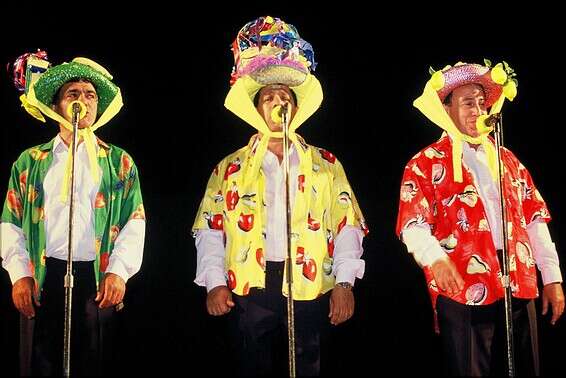The word that Tzachi Hanegbi returned to headlines in Hebrew from ancient times • And what other Hebrew words are used in the world?
Tzachi Hanegbi in Ofira and Barco's program
Photo:
From the program
Minister Tzahi Hanegbi's "miserable speech" "No hungry people in Israel, this is remorse," once again raised the word 'regret' which is becoming more widespread, becoming one of the common words in Israeli slang.
Remorse stormed into the Israeli slang in the early 1960s or 1970s. It can be found in a late installment of the 'Banks on You' search: "Leave it, it's a shame, it's not worth anything." The source of the Arabic word harat, which means fiction. She is also written with remorse as well as her own.
Remorse has received various developments. Numerous form of Engraving, expanding form: Engraving. Uri Ariel on Israel's response to the summit attack, 2013: "This is not a war on terror, it is a thorn."
It is quite common to multiply by B, Kharta Bertha, a pattern known from combinations such as Shanti Banti, which is very common. Among other things, during his interrogations, Ehud Olmert responded to the allegations against him: "Everything is remorse Bertha". The phrase is written in the name of subliminal and the shadow: "Everyone stopped leaving everything you choose me, everything regret Bertha, believe only in myself."
'Repentance' gave birth to a Hebrew verb: to engrave. The scouts were happy to use Dan Almagor's "Marco Polo": "With his wife he sat for about a month, digging for Tibet." The verb appears in the slang dictionary of Dan Ben Amotz and Netivah Ben Yehuda. In the second part of the dictionary also appears the title 'engraving', "a derisive nickname for a man who speaks nonsense, nonsense". Extensions: Engraver Abu Jasmine, Engraving King of the Nabataeans.
We received various dialects from Arabic, from the same root of the Tharvath. Palestinian Arabic: Tahrabat (confused); Moroccan Arabic: Thaw (distortion, confusion). A telephone company even put it in its advertisements against a rival company: "This is not a revolution - it will be rolled up!" And in Hebrew, by the words: Wrath.
Bobcas. In Yiddish, originally: The fruit of the day, and in borrowing: Important things.
Bullshit. Literally, in English: bull dung.
Blah blah blah. In English: blah blah blah.
Devine. In Arabic: Abel words, false boast, Divan's broken plurality: Recommended literature. Israeli abbreviation: Devin.
Rubbish. Ecclesiastical Contribution to the Database. It is also possible: vanity and evil spirits .
Mae foot. In English, literally: my leg.
Nonsense. In English: nonsense, illogical.
nonsense. Generic contempt word for canceling opponent's position. Also: scurvy, scruffy ass, scruffy, scruffy. A possible source is in the Talmudic-Aramaic dialect 'Istra Balgina Kish Kish Kari'.
Nonsense. Another keyword. Nonsense is a Talmudic word. The widespread use of the word has to be attributed to Yiddish, where 'nonsense' (the driver of the flight) means the words of vanity, plural: nonsense, and noun: nonsense. Extensively nonsense in juice, nonsense in tomato juice, following the German phrase Quatsch mit Sosse.
We ate blows, and went out in white
This week, the monastic lionist John Elihi died at the age of 94. John was a monk in the category of 'working monks', monks without a monastery. He chose to work in Mandatory Palestine, and began to document Palestinian Arabic on its various dialects. The result was an accessible, comprehensive and reliable Palestinian-Hebrew dictionary in Hebrew letters. After a few years, the dictionary also appeared in English. John also developed dialects in various languages, and not only in Arabic. I spoke to John two weeks before he passed away, a conversation with no specific purpose, he was a Jerusalem friend, a kind and simple man. In memory of Yohanan, a collection of Arabic-language phrases is expressed, from the "New Dictionary of Spoken Arabic" published in 1999 by the Ministry of Defense and Kasat.
food. This verb, which corresponds to the Hebrew eating, has several meanings: eating food, and also absorbing beatings: eating Hai Ala Rasha (she got hit on the head), and absorbing insults.
Ah. Blind with one eye. Arabic proverb: Enem al-Amayan al-A'ar Malak - In the blind with one eye he is king. Reminiscent of the Aramaic Segi Nehur.
Jab. Brought, also used in birth meaning. Kismam Lajibat - maternity ward.
Danya. world. Arabic proverb: Ed Danya Dalach, day after day. The world is rolling, a day in your favor, a day against you.
he. Love. Built to El Hao, prostitutes, verbal: the love girls.
Wajah. Face, side. Telena Babiad El Vajja: We went out with dignity, literally: We went out in a white face. We went out in a black face (sad) - we went out in shame.
Khatr. Thought, will.In Khatrach: Goodbye, Verbal: You want to, and to that you respond: Essa salama (with peace or health).
Tajuna. Mill, scent. Between Hajjarin but Tajuna: Between the two scent stones. Parallel to "between the hammer and the anvil", and in the Bialik version closest to Arabic: between the vehicle and the vehicle.
There. Oven. Al-Aul - December, where the first oven lights up. Ethnic Thanay: January, where a second oven lights up.
digestion. yarmulka. The proverb says: Biham al-Habah Kaba: He is building a dome from the dome. The equivalent: doing an elephant fly.
Slide. piece. Tip of glass: a piece of bread. Slide and Sharpness: A man without wisdom, made of one piece. Ama slide - what a piece, in the erotic meaning. You also practiced Shapa, the word was adopted in the Israeli slang.
The white harp and horse named Chutzpah
Many comments and additions came to the column dealing with Hebrew words adopted in world languages. Thanks to readers Abraham Cherry, Ora Mundshein, Ze'ev Jonas, Hagit, Yuri Moore, Mali Selay, Soup Boom, Nitzan Vardi, Nati Kantrowitz and Amram Klein.
Uriah . Danish uriapost means a dangerous message, following the story of her Hittite.
Armageddon. The place where the final battle will take place, following 'Mount Megiddo'.
Eggshells. Many years ago, I was in Italy and there a Roman Italian told me "I was a consolation visitor, and I ate Wabus D. Blood: hard-boiled eggs, as is customary in mourning houses."
Bruhaha. In English brouhaha. According to Webster's Dictionary, there is a hypothesis that the word originates in the Hebrew phrase 'Welcome.' Originally the French means a noisy, and by extension, a confusing noise state.
Congratulations. In Danish, the word birkes is a poppy seed, probably following the Sabbath, which is said to be a blessing in Yiddish.
Hell. In Polish gehenna, he suffered much, as did the Jews in Auschwitz.
Gid. Jade is a derogatory nickname for Jews only under Russian influence, and in this sense is widely used in Russian, Belarusian, Ukrainian, Romanian and the Baltic languages. In contrast, in Polish, Czech and Slovak, this is a standard word that is also accepted by Jews.
Member. In Hungarian the word haver means as Hebrew, friend.
gall. About twenty or so years ago, I visited London. The newspaper reported that in a horse competition held there the day before the agile horse won the chootspa.
kosher. In Polish, kosher is koszerne.
white. In Danish laban means harp, who is not behaving properly, following the Aramaic son in the Bible.
luck. In Hungarian the word mazli means Hebrew, luck. slamasztika describes a situation of unlucky luck, and probably the word was derived from the word schmitzel.
kennel. In Polish, 'melina' is used as a hiding place. Even the hiding places of Jews or underground members during the German occupation called it that way.
barrel. Originally, it is the name of the plant whose stem grows near water sources, a word that came out of Hebrew and rolled through Greek and Latin into European languages. From it were derived from contemporary English cane (cane) and cannon (cannon).
Sabbath. In Russian, Saturday is called "Sobota." There is a popular Russian song with this word in popular pronunciation 'Subotia'. The song begins with the words "We have Subotia today", which means a festive day off.
• Tzachi Hanegbi: "Nothing to eat? Remorse"
• After the storm: Hanegbi expressed remorse for "repentance"
• Shacham: "This is not an emergency government, this is a
Samaritan " government of regret . Requiring help to the person you saw injured or the victim of a crime. In Danish samarit means a person who provides first aid.
Depression. In Danish, shofel means rude or unfair, according to the Hebrew-Yiddish word low.









